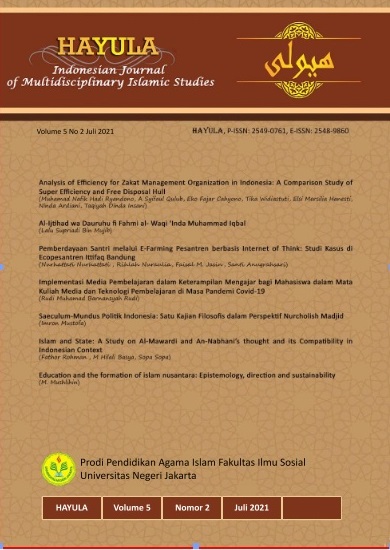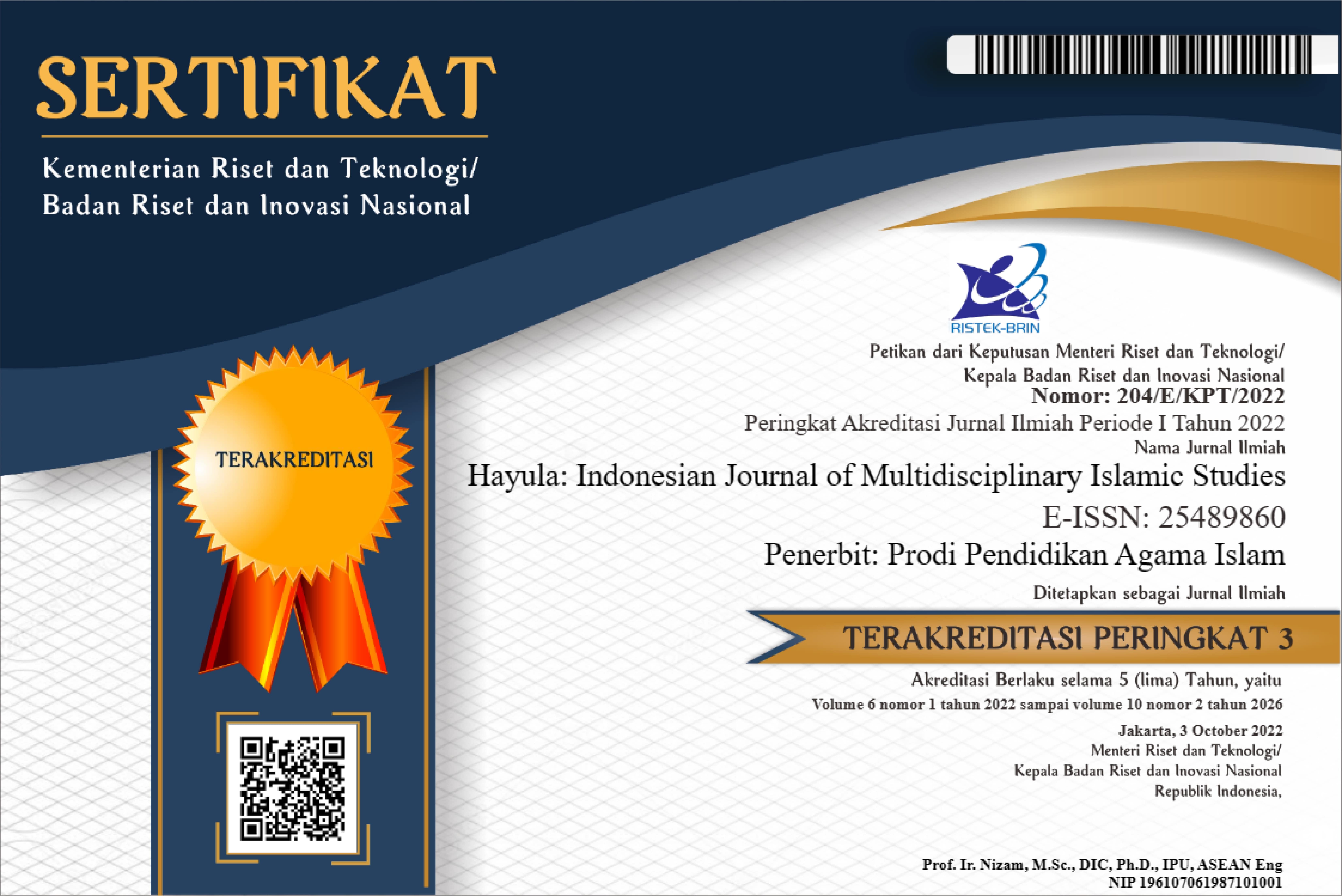Al-Ijtihad wa Dauruhu fi Fahmi al- Waqi ‘Inda Muhammad Iqbal
DOI:
https://doi.org/10.21009/005.02.02Keywords:
الكلمات المفتاحية: الفكرة، محمد إقبال، الاجتهاد، مصلحةAbstract
This article presents Muhammad Iqbal's thoughts on the role of ijtihad in understanding the reality of modern life. This article aims to analyze and explain the life history of Muhammad Iqbal and his thoughts on the role of ijtihad in understanding the reality of modern life. This article uses a library research approach (library study) with a descriptive analytical method. The data derived from primary data sources and secondary data sources. The data were obtained by means of documentation utilizing the previous results of research written in books and journals. This article concludes that Muhammad Iqbal was a visionary Muslim figure and thinker who made a real contribution to the field of ijtihad. This visionary view succeeded in synergizing his knowledge and experience both conceptually and practically to solve the problems faced by Muslims. Ijtihad which plays a role in understanding the reality of modern life is collective ijtihad, that is, an ijtihad which is not limited by particular schools of thought and certain schools of jurisprudence, but rather an ijtihad that involves multi-skills and knowledge both in the fields of Islamic studies and science to achieve the benefit of the people ‘maslahah’. Collective ijtihad is currently appearing in the form of various fatwa institutions in the world, both in countries where the majority of the population is Muslim or in the minority.
References
Al-Barri, Z. (1404). al-Ijtihad Fi al-Syari’ah al-Islamiyah. Mu’tamar Al-Fiqh Al-Islamy.
Al-Hakim, A.-N. (1411). al-Mustadrak ‘Ala al-Shahihain (M. A. al-K. Al-Atha (ed.); 1st ed.). Dar al-Kutub al-Ilmiah.
Al-Qardhawi, Y. (1424). al-Fiqh al-Islami Baina al-Ashalah wa al-Tajdid. Maktabah Wahbah.
Al-Qardhawi, Y. (1998). al-Ijtihad al-Mu’ashir Baina al-Indibath wa al-Infirath (2nd ed.). al-Maktab al-Islami.
Al-Sayis, A. (1970). Nash’ah Al-Fiqh Al-Ijtihâdî Wa Athwaruhu. Majma’ al-Bahtsiah al-Islamiah.
Al-Sayis, M. A. (1410). Tarikh al-Fiqh al-Islami (1st ed.). Dar al-Kutub al-Ilmiyah.
Al-Syaukani, M. A. (1412). Irsyad al-Fuhul Ila Tahqiq al-Haq Min ‘Ilm al-Ushul, (A. M. M. S. Al-Badri (ed.); 1st ed.). Dar al-Fikr.
Al-Zuhaili, W. (1986). Ushûl Al-Fiqh Al-Islâmi (2nd ed.). Dar al-Fikri.
Ali Rusdi, M. (2017). Maslahat Sebagai Metode Ijtihad Dan Tujuan Utama Hukum Islam. DIKTUM: Jurnal Syariah Dan Hukum, 15(2), 151–168. https://doi.org/10.35905/diktum.v15i2.432
Arief, A. S. (2017). Ijtihad dan Dinamika Hukum Islam. IN RIGHT Jurnal Agama Dan Hak Azazi Manusia, 7(1), 1–15.
Choiriyah, C. (2018). Muhammad Iqbal; Pemikiran Politik dan Sumber Hukum Islam. Mizan: Journal of Islamic Law, 4(1), 87–102. https://doi.org/10.32507/mizan.v4i1.175
Duraini, M. F. (1418). Al-Manahij al-Ushuliyah Fi al-Ijtihad Bi al-Ra’yi Fi al-Tasyri’ al-Islami (3rd ed.). Mu’assasah al-Risalah.
Faishal Agil Al Munawar, & Mirwan. (2020). Ijtihad Jama’i (Ijtihad Kolektif) Perspektif Ulama Kontemporer. Istidlal: Jurnal Ekonomi Dan Hukum Islam, 4(2), 127–137. https://doi.org/10.35316/istidlal.v4i2.268
Gazali, A. H. al-. (n.d.). Al-Mustashfa Min Ilm Al-Ushul. Dar Ihya’ al-Turats al-Arabi.
Hanna, S. (2012). Urgensi Ijtihad Kolektif dalam Permasalahan Kontemporer. Media Syariah, 14(2), 173–184.
Hasanuddin, F. (2019). Ijtihad Maqashidi: Metodologi dan Kontekstualisasi Hukum Islam di Indonesia (Studi Fatwa-fatwa Majelis Ulama Indonesia). Al-Mawarid: Jurnal Syariah & Hukum, 1(2), 134–153. http://arxiv.org/abs/1011.1669%0Ahttp://dx.doi.org/10.1088/1751-8113/44/8/085201
Hawi, A. (2016). Muhammad Iqbal dan Ide-Ide Pemikiran Politiknya. Madania, 20(2), 241–250.
Hendri, K. (2016). Pemikiran Muhammad Iqbal Dan Pengaruhnya Terhadap Pembaruan Hukum Islam. Al-’Adalah, 12(3), 611–622. http://ejournal.iainradenintan.ac.id/index.php/adalah/article/view/879%5Cnhttp://ejournal.iainradenintan.ac.id/index.php/adalah/article/viewFile/879/760
Husain, H. (2019). Metode Ijtihad Kontemporer Menurut Yusuf Al-Qaradawi. Sulesana: Jurnal Wawasan Keislaman, 13(2), 145–163.
Ibnu Manzhur, M. (1412). Lisan al-Arab (1st ed.). Dar Ihya’ al-Turats al-Arabi.
Indrajaya, D. T. (2013). Kontribusi Pemikiran Muhammad Iqbal dalam Pembaharuan Hukum Islam. Hukum Islam, XIII(1), 1–12.
Iqbal, M. (1421). Tajdid al-Tafkir al-Diny Fi al-Islam, Translate: Abbas Mahmud (2nd ed.). Dar al-Hidayah.
Jailani. (2017). Penerapan Ijtihad Maqasidy al-Jama’i dalam Legislasi Hukum Jinayat di Aceh. Istinbáth, 16(1), 112–127.
Kartawinata, A. (2016). KONSEP METAFISIKA MUHAMMAD IQBAL. Al-A’Raf, XIII(1), 47–63.
Kholidah, Z. (2018). RELEVANSI PEMIKIRAN MUHAMMAD IQBAL DALAM PEMBENTUKAN KARAKTER SISWA DI ERA MILLENIUM. TA’LIM, 1(2), 288–308.
Masruri, M., Muqowim, & Radjasa. (2020). KONSEP KHUDI IQBAL DALAM PENGEMBANGAN KREATIFITAS PEMBELAJARAN DI MADRASAH. Jurnal Penelitian Keislaman, 16(1), 46–59.
Muchamad Agus Munir. (2017). Rekonstruksi Pendidikan Islam (Studi Kritis Filsafat Pendidikan Islam Muhammad Iqbal). EL-TARBAWI, X(1), 1–18.
Mujahidin, S. (2016). Penerapan Ijtihad Kolektif di Kalangan Muhammadiyah, NU dan MUI (Studi Komparatif pada Masalah-Masalah Kontemporer) [UIN Antasari]. https://idr.uin-antasari.ac.id/4550/
Muslim, I. al-H. (n.d.). Shahih Muslim (M. F. ’Abd Al-Baqi (ed.)). Dar Ihya’ al-Turats al-Islami.
Mustofa, I. (2017). Collective Integrative Ijtihad An Attempt of Developing Contextual Fiqh Mu’amalah As The Foundation Of Shari’ah Business Product. Aid Conference International Conference on Social Sciences and Humanities (ICOSAH) Oum, Seremban, November, 234–262.
Puspitasari, R. (2017). Pendidikan Islam Menurut Muhammad Iqbal. Manhaj: Jurnal Penelitian Dan Pengabdian Masyarakat, 6(3), 2–13.
Rohman, H. (2018). Maqasid al-Syari’ah Mazhab Syafi’i dan Urgensinya dalam Ijtihad Kontemporer. Jurnal Hukum Islam, 16(2), 188–204.
Rusdin. (2016). INSAN KAMIL DALAM PERSPEKTIF MUHAMMAD IQBAL. Rausyan Fikr, 12(2), 251–271.
Sakirman. (2015). Meretas Kebekuan Ijtihad Dalam Konstruksi Fiqih Sosial. Mizani, 25(1).
Sanu, M. Q. (2001). Fikrat al-Ijtihad al-Jama’I Tarikhan wa Waqi’an. Mathabi Rinud al-Haditsah, Qatar University.
Sulthon, M. (2019). IJTIHAD DAN KONTEKSTUALISASI HUKUM ISLAM. Ar-Risalah: Media Keislaman, Pendidikan Dan Hukum Islam, 17(1), 71–86.
Supriadi, L. (2016). al-Washathiyah al-Islamiyah Bi Indunisiya Baina al-Waqi’ wa al-Tahaddiyat. The 16th Annual International Conference on Islamic Studies, 30–43.
Suriadi, A. (2016). Muhammad Iqbal, Filsafat dan Pendidikan Islam. Tsarwah (Jurnal Ekonomi Dan Bisnis Islam), 1(2), 45–60.
Tirmizi, M. B. I. (1327). Jami’ al-Shahih (A. M. S. Et.all (ed.); 5th ed.). Dar Ihya’ al-Turats al-Arabi.
Widyastini, W. (2017). Konsep Pemikiran Filsafati Muhammad Iqbal Tentang Pendidikan Dan Relevansinya Dengan Pembangunan Karakter Bagi Bangsa Indonesia. Jurnal Filsafat, 27(1), 125. https://doi.org/10.22146/jf.22089
Zulkarnain. (2016). Filsafat Khudi Mohammad Iqbal Dan Relevansinya Terhadap Indonesia Kontemporer [UIN Sumatera Utara]. In Pascasarjana UIN Sumatera Utara. https://adoc.pub/filsafat-khudi-mohammad-iqbal-dan-relevansinya-terhadap-masa.html
Downloads
Published
How to Cite
Issue
Section
License
Authors who publish with this Journal agree to the following terms:
- Author retain copyright and grant the journal right of first publication with the work simultaneously licensed under a creative commons attribution licensethat allow others to share the work within an acknowledgement of the work’s authorship and initial publication of this journal.
- Authors are able to enter into separate, additional contractual arrangementfor the non-exclusive distribution of the journal’s published version of the work (e.g. acknowledgement of its initial publication in this journal).
- Authors are permitted and encouraged to post their work online(e.g. in institutional repositories or on their websites) prior to and during the submission process, as it can lead to productive exchanges, as well as earlier and greater citation of published works.
Users/public use of this website will be licensed to CC BY







